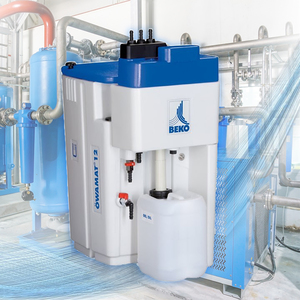
 |
Charlotte Stonestreet
Managing Editor |
| Home> | POWER TRANSMISSION | >Pneumatics & Hydraulics | >Know your responsibilities |
Know your responsibilities
12 June 2023
Manufacturers face a £20,000 fine and, at worst, imprisonment, for failing to comply with regulations coveroing the disposal of compressed air condensate. Yet many companies are unaware of the regulations and their responsibilities under them, warns Steve Boults

ALMOST ALL manufacturing processes use compressed air in their operations and condensate is a by-product of the compression process. It is caused when airborne contaminants such as oil, water, solid particles and micro-organisms, as well as lubricants, rust and pipescale from the equipment itself, are sucked into the system. This toxic mixture gets compressed, resulting in a concentrated mix of contaminated oil and water.
Compressed air condensate is classified as hazardous waste and the legislation relating to its disposal is stringent. Companies which fail to comply can face fines of £20,000 and, in worse case scenarios, directors can receive a prison sentence.
The solution to safely disposing of condensate – an oil/water separator – is simple and relatively low cost. Yet the number of compressed air users who do not employ one is surprisingly high. We estimate that up to 40% of compressed air plants fail to employ an oil/water separator, and a further 5% to 10% have one but fail to maintain it properly. This applies to SMEs and multinationals alike.
The result is that the hazardous waste is discharged down the drain into the waste water system or, worse, directly onto the compressor house floor, where it can drain to the ground outside and make its way into local waterways. This activity is illegal.
With the penalties for breaching the legislation so high – and the vital need to protect the natural environment – it is essential that both company managers and operatives on the factory floor understand the regulations governing condensate treatment.
Safe disposal of condensate
Companies must handle all condensate and associated materials in compliance with the Hazardous Waste (England and Wales) Regulations 2005.
This requires installing an oil/water separator to separate the emulsified oil and waste water. Separators can cost as little as £100 and, at most, a few thousand pounds. They can also be retrofitted.
With relevant permissions, the separated waste water can then be drained to the foul sewer, while the oil must be removed by a registered Hazardous Waste Producer or Licensed Waste Carrier.
Compressed air systems are governed by two further pieces of legislation:
- Water Resources Act 1991
This states that it is an offence to knowingly permit entry of toxic waste to surface or ground water. The penalty is a fine of £20,000 or more.
- Water Industry Act 1991
This sets out the administrative requirements relating to the discharge of treated condensate water. It also states that under no circumstances can treated condensate water be discharged to open water such as rivers and streams, ground water or storm/rainwater drains. Breaching the Act can incur fines of up to £20,000 and possible imprisonment for company directors.
These legal ramifications should give companies serious pause for thought, so why do so many fail to fit an oil/water separator?
The main reason appears to be a genuine lack of awareness about the legislation. Also, management might consider compressors the domain of operational teams, while operatives who have inherited legacy equipment without a separator do not question the status quo. Therefore, responsibility falls between two stones.
However, failing to comply with the regulations around condensate disposal presents a very real risk in terms of potential fines and reputational damage. Is that worth it for the price of an oil/water separator?
Steve Boults is capital equipment sales manager at Thorite
Key Points
- Compressed air condensate is classified as hazardous waste and the legislation relating to its disposal is stringent
- Thorite estimates up to 40% of compressed air plants fail to employ an oil/water separator, and a further 5-10% have one but fail to maintain it
- Failing to comply with the regulations around condensate disposal risks potential fines and reputational damage
- Pneumatically actuated architecture
- Piston air motors
- New technical solutions team at Thorite
- Thorite scoops Festo UK Distributor of the Year award
- Foundation in Pneumatics training courses to restart
- ELECTRIC DRIVES & VACUUM TECHNOLOGY COMBINATION
- Pneumatics website is 20
- Work starts on new Thorite UK headquarters
- Technical expertise & systems engineering teams
- Capital equipment & aftermarket solutions



















